 Vampire Weekend's Surprising Jewish Stories
Vampire Weekend's Surprising Jewish Stories
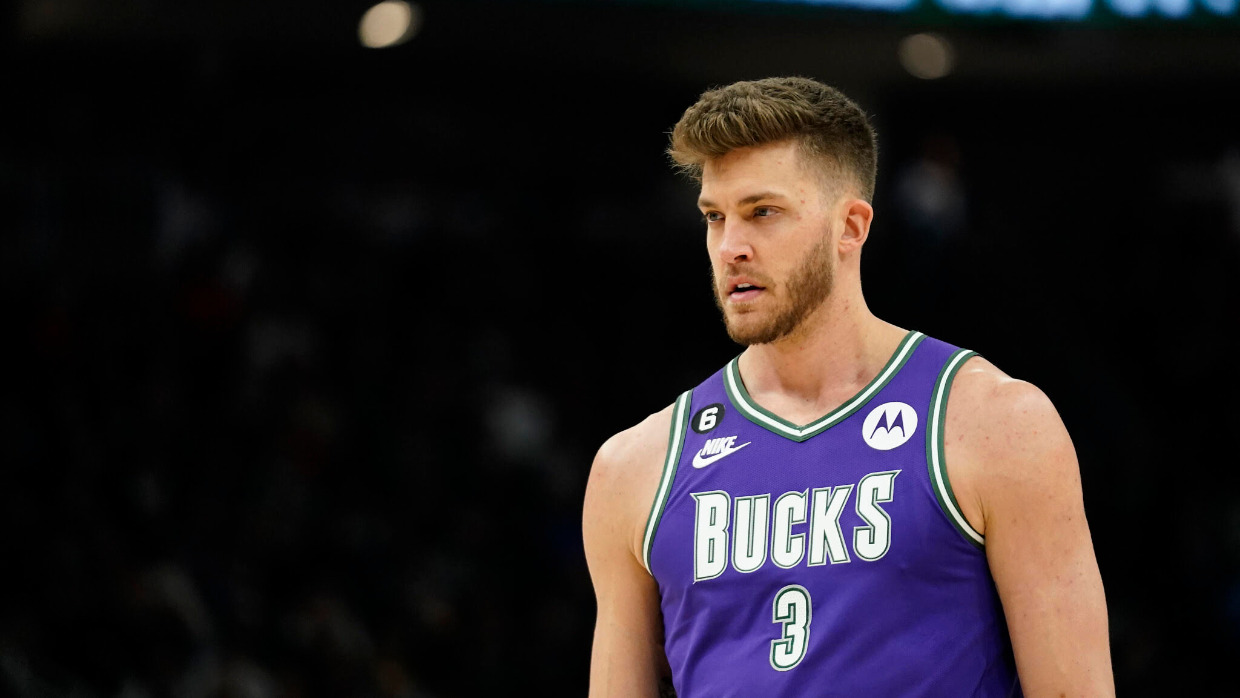

12 min read
There’s a fine line between ignorance and hate. Leonard’s inspiring path to forgiveness and redemption. An exclusive Aish.com interview.
NBA center Meyers Leonard has played in almost 400 games since being drafted by the Portland Trail Blazers in 2012. The average NBA career spans 3.75 years, but this beloved, 7-foot-tall gentle giant is starting his 10th season. If you talked to the guy for 5 minutes, you’d never expect him to have been “canceled” for yelling an antisemitic slur.
After an injury, Meyers spent his recovery playing the online video game Call of Duty: Warzone. While live streaming over Twitch to hundreds of fans, Meyers hit one of those moments of frustration that make gamers explode with rage. He screamed at his opponent, “F***ing cowards… You kike…” He went to bed thinking he hadn’t committed any unusual offense. The next day, the incident blew up all over the internet.
That one, expletive-filled outburst upended his life.
Meyers never made excuses for what he said. Others in the same situation might minimize or rationalize their action, but Meyers was determined to make things right. This led to a two-year journey of contrition, education and outreach. Meyers’s journey goes much deeper than making an authentic heartfelt apology. The incident may have saved Meyers’s sanity, marriage, and even his life (and no, I’m not exaggerating).
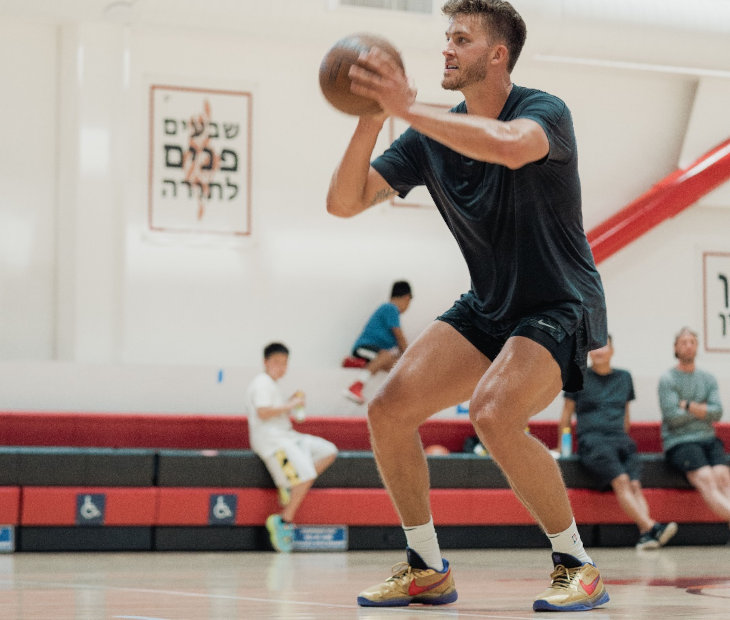 NBA Offseason training at Shalhevet High School
NBA Offseason training at Shalhevet High School
During the incident, Meyers had been playing for the Miami Heat for two years. In the immediate aftermath Meyers was fined $50,000 by the NBA and was suspended for a week. He was condemned by the Heat, the NBA, ADL, and legions of basketball fans. Shortly after, the Heat traded him to the Oklahoma City Thunder, but he never played a single game for them. That one, expletive-filled outburst upended his life.
“I could not wrap my head around the fact that I had made a big, ignorant mistake. I don’t have a hateful cell in my body.” Meyers grew up in Robinson, Illinois, a town of just over 7,000 people. It is a remote, blue collar town that is anything but diverse. “My wife says I walk around with Disney goggles.” Meaning, not only was he ignorant of what the slur meant, but that he’s trusting and looks for the good in people. It didn’t occur to him that what he was saying would have any real impact on anyone.
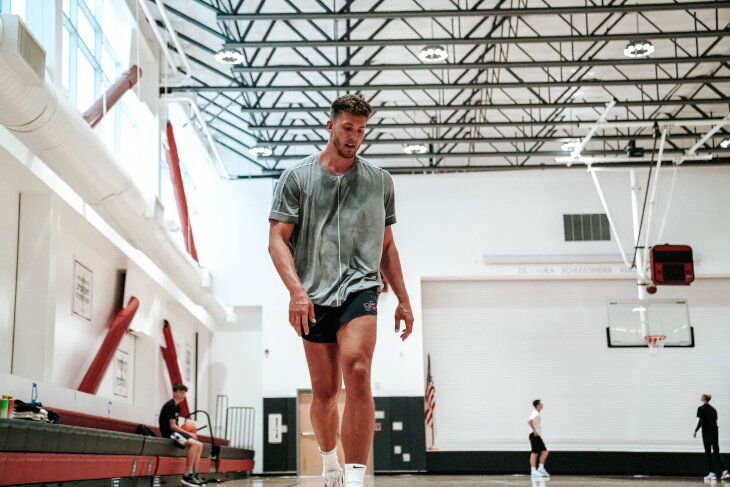
He wanted to immediately own up to and correct his mistake, but where to start? Meyers turned to a close, personal friend Matthew Hiltzik. Not only was Hiltzik an expert in crisis management, he has been active as a board member and supporter of several Jewish organizations and causes. Hiltzik helped Meyers understand what it would take to not just make an apology, but making a lasting impact to make this right. And Hiltzik would be with him every step of the way.
On top of the condemnation, Meyers and his wife were bombarded with brutal messages and terrifying death threats. But there was one message that shined through the vitriolic backlash. Before the incident, Meyers had a relationship with a fan, Shuly Eizicovics. The two had become friends though one of Meyers’s teammates and Meyers regularly gave Shuly and his son tickets to games.
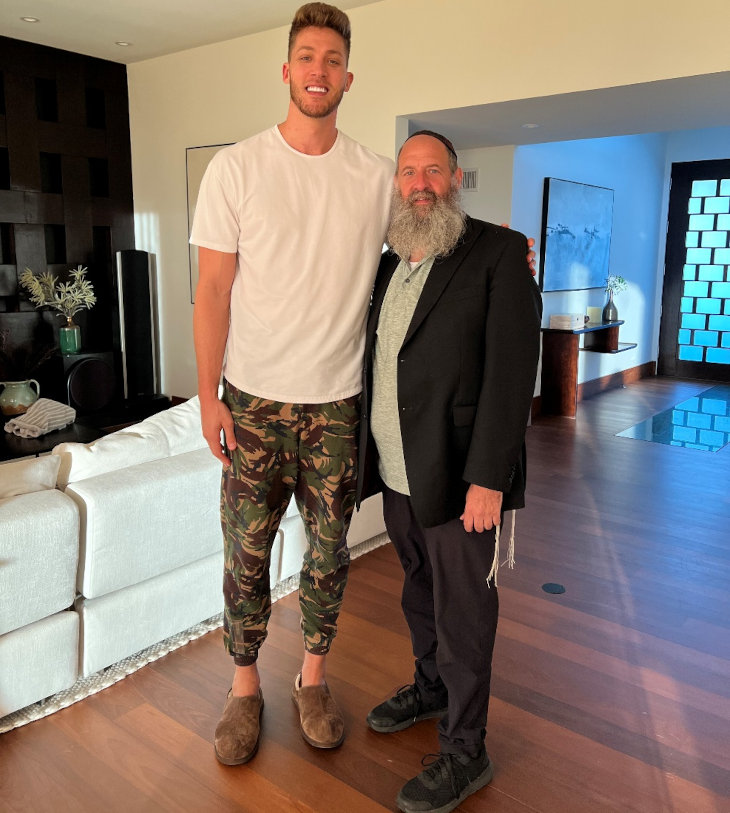 Meyers Leonard with Rabbi Pinny at his house in Los Angeles in November of 2022.
Meyers Leonard with Rabbi Pinny at his house in Los Angeles in November of 2022.
“Shuly and his son were always so kind to me. And I always enjoyed seeing them and talking about basketball and life with them. Shuly called me the evening that everything broke on the internet. He said, ‘I know the Jewish community will forgive you when they see your heart.’ He then connected me the next day with Rabbi Pinny Andrusier of Chabad of Southwest Broward.”
Meyers not only visited Rabbi Pinny’s Chabad, he spent a Shabbat with them. Arriving on his own, Meyers was terrified at how he would be received by the Jewish community. Would he be met with anger and hate? Would his words be used against him like a weapon?
I learned that we all need some Shabbat dinner in our lives. To put our phones down, to communicate, to be in the moment.
Meyers found just the opposite. At the Southwest Broward Chabad, families, children, and Holocaust survivors welcomed him. “Seeing just how open and loving and the conversation that everyone was having. No phones. Great food. Just people loving people. I remember pulling out of his driveway… I was there till 12:15 am and it was the most soulful pure thing that maybe I had ever been a part of. I learned that we all need some Shabbat dinner in our lives. To put our phones down, to communicate, to be in the moment.”
It was clear to Rabbi Pinny that Meyer’s outburst came from a place of ignorance, not hate. He told Meyers, “I already know you have a beautiful heart. One day you’ll learn this happened for you, not to you.”
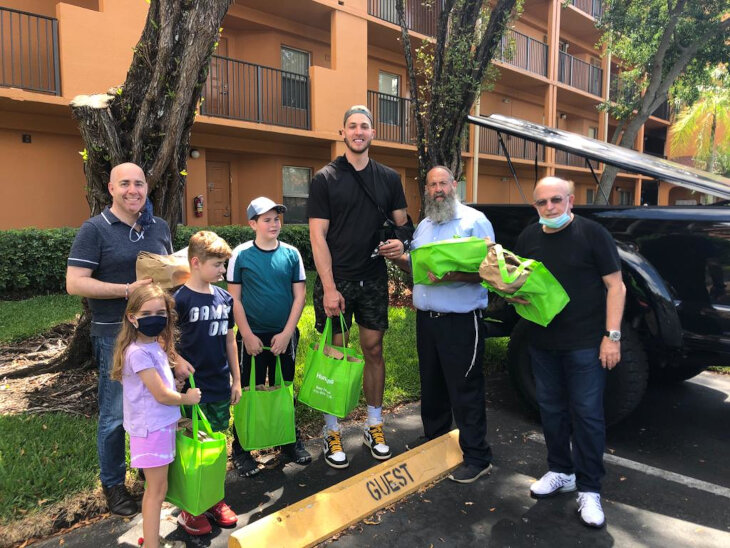 Outside a survivor's apartment with Rabbi Pinny and others, handing out meals for Passover
Outside a survivor's apartment with Rabbi Pinny and others, handing out meals for Passover
From there, Matthew Hiltzik helped Meyers reach out to more communities coordinating discussions and participation in events with the University of Miami Hillel. He spent a week hosting a basketball camp at the Miami Beach community and also hosted a one-day camp at Boca Raton Synagogue. He was brought to tears at the Miami Beach Holocaust Memorial, hearing the heartbreaking stories of survivors first hand. He had held multiple zoom conferences with organizations like Hillel and the ADL listening to the stories of antisemitism plaguing the Jewish youth of today. He funded and personally worked at charity events and Passover meal giveaways.
These are but a few of the many interactions he had in his quest to educate himself over two years, and all done privately, out of the glare of publicity until after he had learned more.
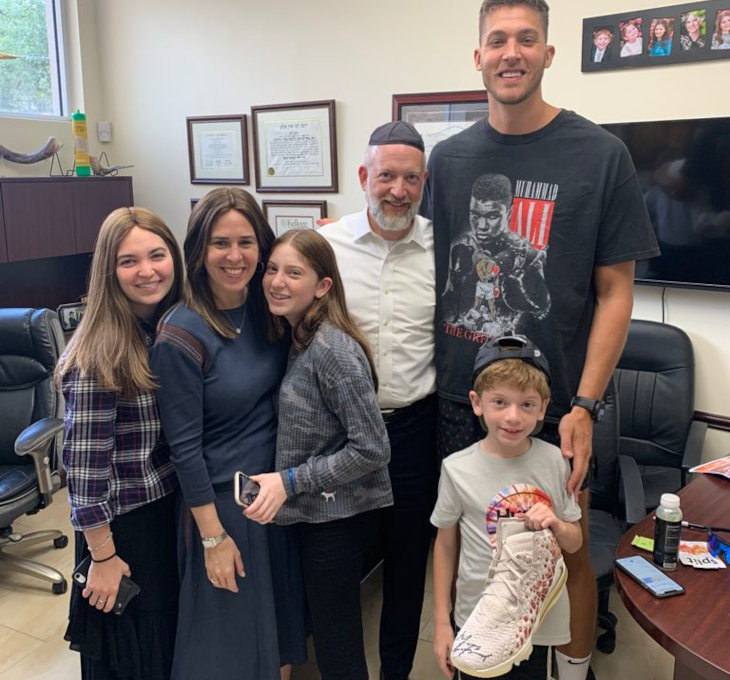 Meyers with the Goldberg family in Boca Raton
Meyers with the Goldberg family in Boca Raton
A key figure that Hiltzik made sure Meyers met was Rabbi Efrem Goldberg from Boca Raton Synagogue. This meeting lead to a profound shift in Meyer’s entire perspective. He told him, “You have such an opportunity…When someone like yourself is willing to be an ally and an advocate and to use your platform and speak about hate, that is extremely powerful. And I need you to know that.”
Meyers realized that his journey for redemption wouldn't end when the backlash died down. “This is a lifelong thing for me.”
But then Rabbi Goldberg said something that would put Meyers on a path for healing he didn’t even know he needed: “You will never be your full self until you’re willing to forgive yourself for this.” At the time, Meyers didn’t know how or understand why he would need to do that.
Meyers was learning more and more about the pain and fear of the Jewish community. Though he never viewed himself as a victim of a cancel culture that blew one angry word out of proportion, the backlash did take a considerable toll on him. He didn’t realize the experience was reopening wounds of a profound childhood trauma.
“My father passed when I was very young. I was only six years old. And I have always sought love from other people because I was so empty for so long.”
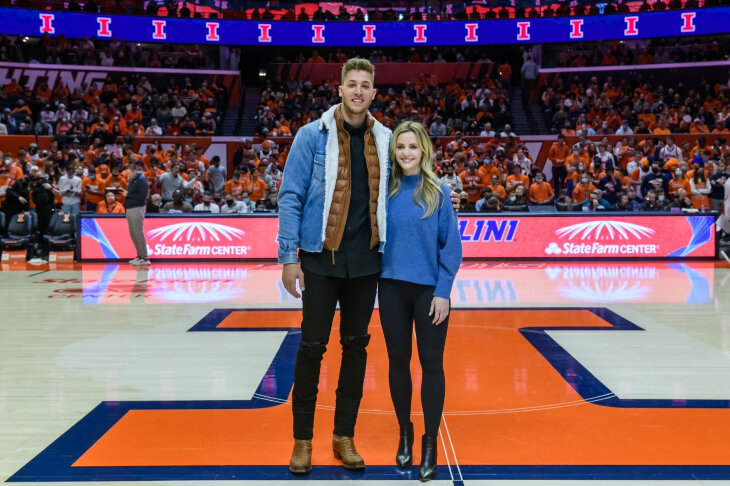 Meyers and Elle Leonard return to University of Illinois for basketball games and to speak at the campus Chabad
Meyers and Elle Leonard return to University of Illinois for basketball games and to speak at the campus Chabad
Shortly after signing his first contract to join the NBA, Meyers thought he would finally feel the love and accomplishment he believed he needed. But then severe anxiety overcame him. “Early in my NBA career…I really went into a dark place of depression. Anytime I pulled up to the arena in Portland, it felt like I had a thousand bricks on my chest. And I didn’t understand why but I never told anybody. Anytime I was in my car and alone, almost always I would cry. Then I’d put myself together and walk in like I was Superman.”
Though he had reached out to the Jewish community and was trying to set things right, his emotional struggles were getting more intense and more frequent. They were starting to interfere with his training and his marriage. The backlash from the incident was “like pouring gasoline on the trauma.” It wasn’t until he felt like the entire world hated him that he was ready to admit that he needed help.
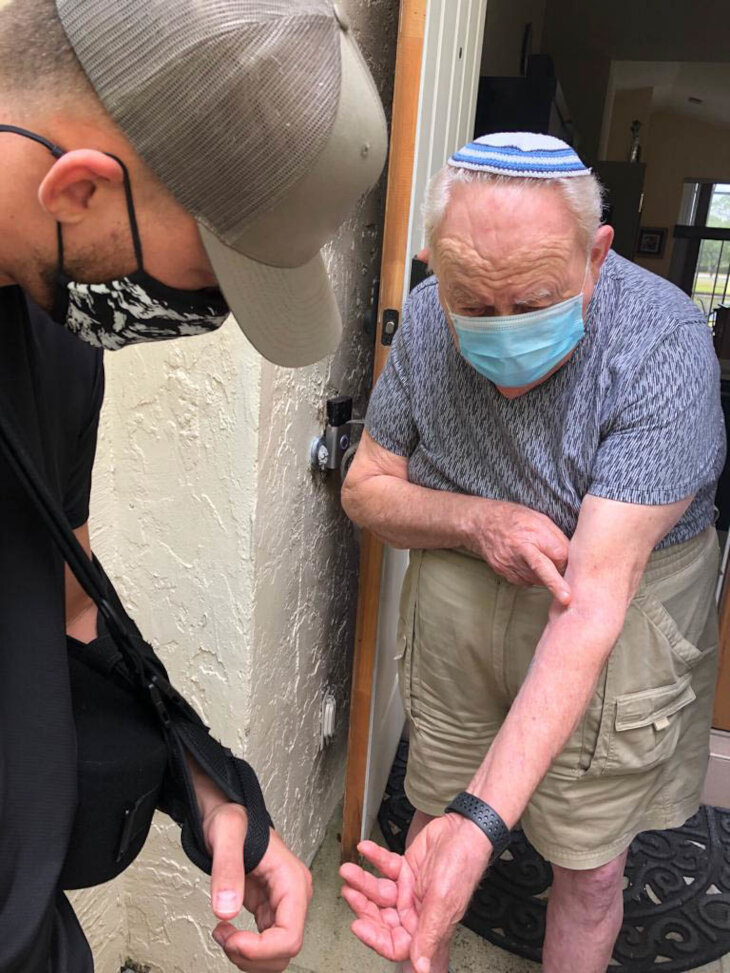 Meyers meets his first Holocaust survivor at Passover event which Meyers sponsored.
Meyers meets his first Holocaust survivor at Passover event which Meyers sponsored.
Meyers has never been afraid to put in the hard work for his career or to help others. But would he be able to do the self-work necessary that therapy demanded? The EMDR therapy he sought forced him to face the demons of his past. Meyers worked on gaining the ability to forgive and ultimately love himself in a way that he didn’t know was possible.
From these efforts, the panic attacks not only became less severe, Meyers has gained the ability to coach himself through them. He no longer seeks an escape from his feelings in the form of video games, but instead is closer than ever with his wife, son and friends. And if he does have free time, he spends it playing guitar. Had Meyers never been forced to faced his trauma, the pressures of family, fatherhood, and the NBA likely would have led to disaster. It is finally clear to Meyers the wisdom of Rabbi Pinny’s comment, this happened for you, not to you.
Hateful speech is prevalent in internet forums and online gaming. “Locker room talk” and joking around at the bar after a few beers is bound to yield language no one would want to be caught on the record saying. Most of these comments aren’t really motivated by hate, but are learned and emulated behaviors. This is likely how Meyers found himself thoughtlessly trash talking with a racial slur. But that ignorance doesn’t excuse or justify the behavior.
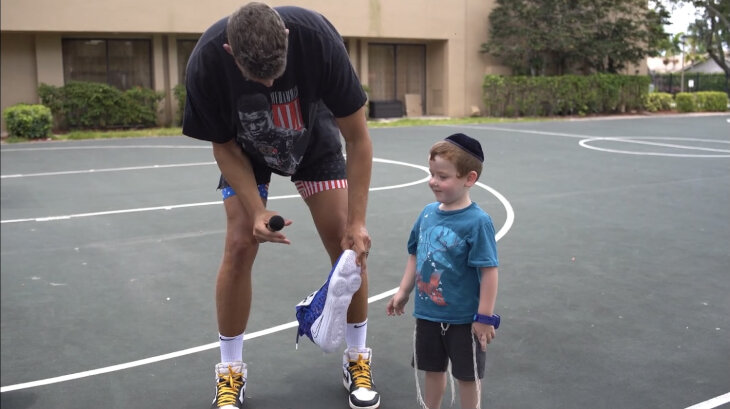 Meyers hosts a camp at Boca Raton Synagogue for kids, giving away autographed game-worn shoes while speaking to families.
Meyers hosts a camp at Boca Raton Synagogue for kids, giving away autographed game-worn shoes while speaking to families.
Now when Meyers hears such thoughtless language, he takes a stand. “If I hear someone maybe using language in general, I stop them immediately and I say ‘Look, I’m not your dad… but take it from me. Words are powerful and they hurt people. This is not funny. This is not a joke.’”
Before the Call of Duty incident Meyers didn’t have the confidence to stand up and be the person he knew he should be. The Superman persona was a mask. But from the therapy work he has put in, the people he has met, the relationships he has built, and the trauma he has overcome, he is finally able to use his platform to help dispel ignorance for millions. The persona is no longer a mask.
The Talmud teaches that genuine teshuvah, repentance, transforms the transgression into a merit. The mistake propelled you to become a better person. Meyers Leonard has reached this level of repentance.
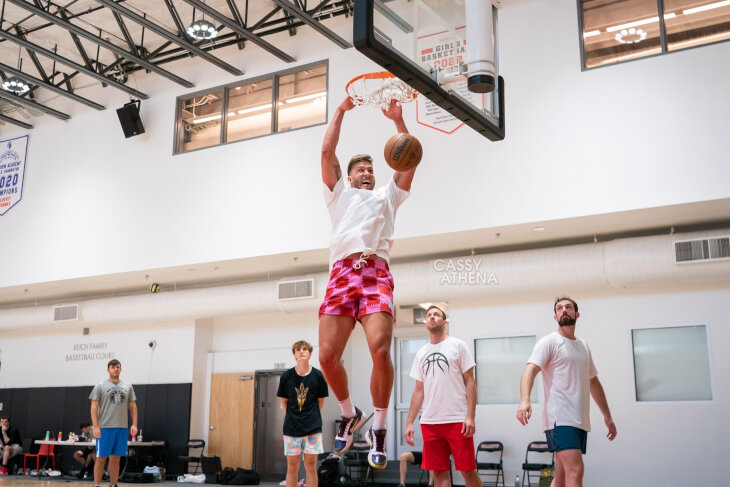
Meyers just signed a full season contract with the Milwaukee Bucks. In March he played his first game in 2 years. Almost as if by Divine hand (Meyers’s own words) – he played against the Miami Heat; his journey had come full circle. Though he had done so much work and gained newfound confidence, he was still terrified of what his teammates (former and current), his fans, and the public at large would think of him. But an open letter allayed much of that anxiety and reassured him that everything was going to be okay.
An open letter to the Milwaukee Bucks and to Meyers Leonard.
My name is Moishe Steigmann, and I am a Milwaukee native, a current Milwaukee resident, a Jew, a rabbi, and a passionate sports fan. I heard the news that the Milwaukee Bucks have recently signed Meyers Leonard, and I simply want to say "thank you." Thank you to the Milwaukee Bucks for signing Meyers, and thank you to Meyers for all that you have said and done over the past couple of years.
By now, most of us have heard of Meyers' antisemitic slur from a couple of years ago, his suspension from the Miami Heat, and that he hasn't played in the NBA since. What I hope we have all heard even more loudly, though, is everything he has done to learn about the slur he used, to build meaningful bridges with the Jewish community, and the efforts he has put in ensure that he'll make different choices now and in the future.
Indeed, the best measure of a person's character is how they grow, not a mistake they made years ago. By that measure, Meyers is a genuine role model.
Judaism, in fact, teaches about the deep value of teshuvah, a process of repentance central to our High Holidays. Meyers has epitomized that process, showing us what true teshuvah is and modeling for all people – not just Jews – how to learn, grow, and make oneself a true enemy of hate.
So I want to thank you, Meyers, for all you have done and thank the Milwaukee Bucks for signing you. Everyone deserves the opportunity to learn, to grow, and to shine, and I thank the Milwaukee Bucks for offering that to you.
Welcome to Milwaukee!

As a retired psychologist and as a Jew, I would like to commend Meyers not only for his efforts to understand and repair the effects of his comment in the Jewish community, but also for his efforts to understand and repair himself. Even in this day and age, people who seek help through psychotherapy are often viewed with disdain. They may be viewed as weak or inept in some way. Actually those people are the courageous ones. It takes a great deal of bravery to look genuinely at "the man in the mirror," see the desired changes, and put in the work to change them.